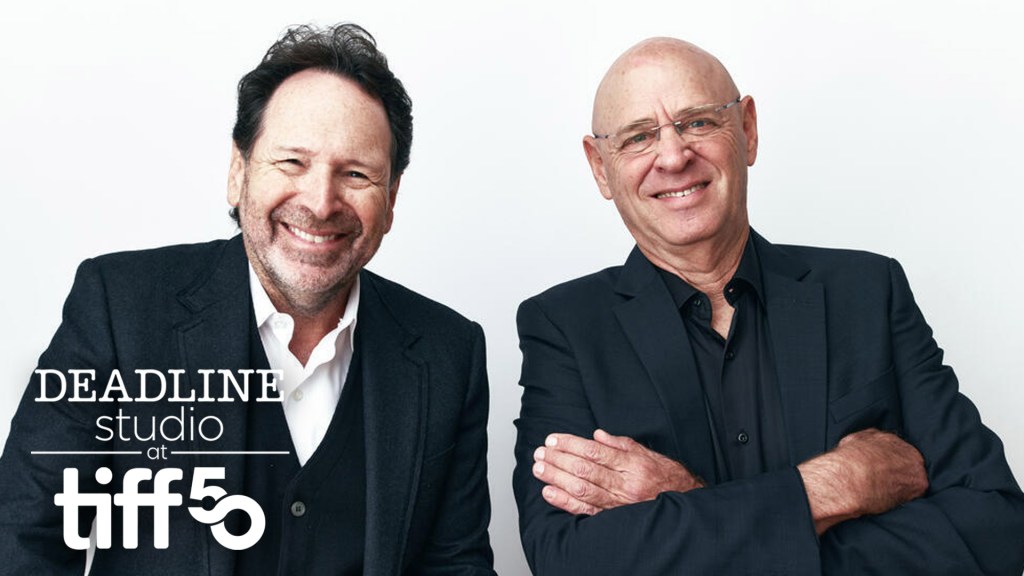One of the most highly anticipated films of the Toronto International Film Festival makes its world premiere Wednesday – at TIFF’s biggest venue.
The Road Between Us: The Ultimate Rescue, about a retired Israeli general’s attempt to save his family on October 7 after the Hamas terror attack on Israel, has sold out Roy Thomson Hall, which seats more than 2,600. My colleague Anthony D’Alessandro broke the story that the film had been invited to the festival, then disinvited. Eventually, it was reinvited – capping a saga that turned the documentary into possibly the most talked about film at TIFF’s 50th edition.
Director Barry Avrich and his protagonist – Ret. Gen. Noam Tibon – came by Deadline’s Toronto Studio ahead of the world premiere.
“I’m happy that the film was reinstated, but it was emotionally stressful for me,” Avrich told us. “Did I anticipate that certainly there would be some controversy with the film, debate and dialogue, because we filmed in Israel? Yes, but that to me was just noise, because again, anybody that would have an issue with the film hasn’t seen it. And so I always hoped… that the takeaway was going to be the family and not the politics. If that’s naive, so be it. But I cared about what [Gen. Tibon] accomplished on that day.”

Retired Israeli Gen. Noam Tibon in the documentary ‘The Road Between Us: The Ultimate Rescue’
Courtesy of TIFF
What Tibon accomplished was to spring to the aid of his son, daughter-in-law and two grandkids who were living on a kibbutz seized the morning of October 7 by Hamas gunmen.
“It was a crazy day, a unique day, and I used all the skills that I have, my instincts, my experience,” Gen. Tibon recalled. “I think the main lesson is that when you are in a chaotic situation and when your family or your people [are] under huge risk, there can be solutions. And the worst situation is to stay at home and watch TV or something like this. And the best way is to try to take action in order to rescue your family. And this is what I did on that day with my wife Gali.”
“Being a father that really touched me,” Avrich commented. “What would you do if you were in this kind of situation?”
No film having to do with October 7th likely could have avoided igniting controversy, given worldwide reaction to Israel’s retaliatory invasion of Gaza, which has cost tens of thousands of Palestinian lives. That invasion continues as the second anniversary of the October 7th terror attack approaches. In disinviting the film, TIFF did not reference either October 7th or Israel’s invasion of Gaza, but said it was concerned the filmmakers hadn’t cleared some footage of the October 7th attack itself. Critics – including Avrich himself, a former board member of the festival – accused TIFF of censorship. Negotiations between the filmmakers and the festival led TIFF to reinstate the film.
“The controversy that erupted out of it, of them inviting it and then not inviting it, and the reaction from media such as yourselves — and you guys have been extraordinarily best in class in saying, what’s going on here? You guys had the exclusive — and that ignited a response from Hollywood that I’m very proud of, very proud of, and saying, whatever side that you’re on, if you’re on a side and there’s no side because it’s family. But if you’re on a side in terms of this conflict, let’s stop for a minute. And why are we protesting a film? If you want to protest what’s going on, protest. I believe in protest. I believe in freedom of speech. But if you’re protesting art, what is the point? Where does it stop? Where does it start? Don’t buy a ticket. Don’t go see this film if you don’t like the subject matter.”
Watch the full conversation in the video above.
The Deadline Studio at TIFF is hosted at Bisha Hotel and sponsored by Cast & Crew and Final Draft.

